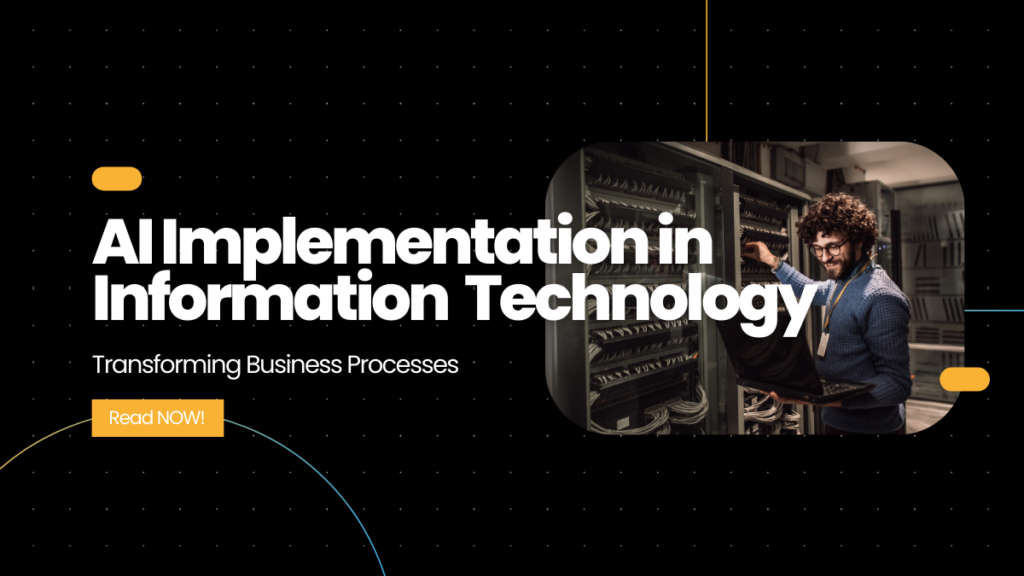Table of Contents
ToggleTable of Contents
- Introduction: The Digital Transformation Landscape
- Understanding AI Integration in IT
- AI-Driven Business Automation
- Strategic AI Business Solutions
- Ethical AI and Governance
- Case Studies
- Future Trends
- Frequently Asked Questions
- Conclusion: Transforming IT with AI
- Call to Action
Introduction: The Digital Transformation Landscape
In the rapidly evolving landscape of digital transformation, Artificial Intelligence (AI) has emerged as a pivotal technology reshaping business processes and IT infrastructure. As organizations globally pursue innovative solutions, AI integration has become essential for maintaining a competitive advantage. The convergence of AI with traditional IT frameworks is creating new opportunities for businesses to reimagine their operational models, enhance decision-making capabilities, and drive sustainable growth.
Understanding AI Integration in IT

What is Digital Transformation in IT?
Digital transformation in IT goes beyond adopting new technologies; it involves rethinking how an organization delivers value to its customers, employees, and stakeholders. AI plays a critical role by:
- Enabling data-driven decision-making.
- Creating personalized customer experiences.
- Optimizing operational workflows.
- Generating predictive insights to drive growth and innovation.
The Impact of AI in IT Transformations
AI integration has become a core strategy for businesses seeking to:
- Automate complex business processes.
- Enhance decision-making with predictive insights.
- Drive operational efficiency through intelligent automation.
- Create adaptive technological ecosystems that respond to changing market needs.
AI-Driven Business Automation
Robotic Process Automation (RPA)
RPA tools help businesses automate repetitive, rule-based tasks that are traditionally done by humans. This improves:
- Task efficiency: Bots perform administrative tasks faster than humans.
- Error reduction: Automated processes eliminate human errors.
- Increased productivity: Workers can focus on higher-value activities.
Cognitive Decision Support
AI systems provide intelligent decision-making capabilities, offering:
- Real-time data analysis.
- Predictive modeling for future outcomes.
- Advanced risk management strategies.
- Contextual insights to inform strategic planning and business decisions.
Strategic AI Business Solutions
Technology Selection
Choosing the right AI tools involves:
- Assessing business requirements: Understand the specific needs of the organization.
- Evaluating scalability: Ensure the chosen technology can grow with the business.
- Integrating with existing systems: Select tools that complement current infrastructure.

Skill Development
Building AI competency within your organization is essential for successful integration. This includes:
- AI and digital transformation training.
- Creating cross-functional AI literacy programs.
- Developing internal AI expertise to ensure sustainability.
Implementation Frameworks
A phased AI implementation strategy helps businesses manage the complexity of integration:
- Pilot programs: Start with small, manageable projects.
- Clear performance metrics: Measure the effectiveness of AI tools and refine strategies.
- Continuous optimization: Regularly assess and enhance AI systems for better outcomes.
Ethical AI and Governance

Transparency
- Clear AI decision-making processes ensure accountability and build trust with customers and stakeholders.
- Explainable AI models help users understand how decisions are made.
Bias Mitigation
AI systems should be regularly audited for:
- Bias in training datasets.
- Inclusive AI models that reflect diverse inputs and ensure fairness.
Privacy Protection
To protect user data:
- Implement robust data protection mechanisms.
- Ensure compliance with regulations like GDPR.
- Minimize data usage to only what is necessary, ensuring privacy and consent.
Case Studies
Manufacturing Sector AI Implementation
Challenge: Inefficient production planning. Solution: AI-powered predictive maintenance and demand forecasting. Result: 25% reduction in downtime, 18% cost savings.
Financial Services AI Integration
Challenge: Complex risk assessment and forecasting. Solution: Machine learning-based risk prediction models. Result: Improved risk accuracy by 35%.
Future Trends
Emerging AI trends in IT transformations include:
- Increased AI-human collaboration for smarter business processes.
- Edge computing combined with AI for more efficient data processing.
- Hyper-personalization driven by AI algorithms.
- Sustainable and responsible AI development for ethical use.
- AI in cybersecurity for smarter threat detection and prevention.

Frequently Asked Questions
Q: What is AI business integration?
AI business integration is a comprehensive approach to embedding AI technologies into core business processes to enhance efficiency, innovation, and competitive capabilities.
Q: How does AI transform business processes?
AI automates routine tasks, provides data-driven insights, and enables more intelligent, adaptive operational strategies.
Q: What are the primary challenges in AI implementation?
- Technical complexity in system integration.
- Skill gaps in AI expertise.
- Initial investment costs for AI tools and infrastructure.
- Ethical and privacy concerns related to AI usage.
Conclusion: Transforming IT with AI
AI is shaping the future of IT transformations by driving efficiency, improving decision-making, and creating new opportunities for businesses. By adopting AI solutions strategically, organizations can stay ahead of the curve, enhance their operational capabilities, and provide better value to customers.
Ready to integrate AI into your IT transformation strategy? Contact PyramidBITS today for expert consultation on AI business solutions and learn how we can help you harness the power of AI.




